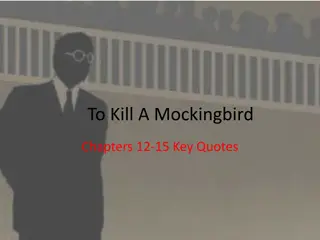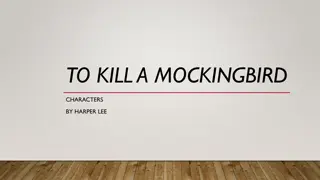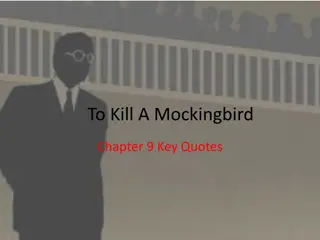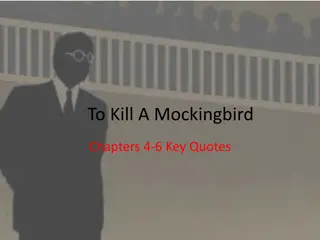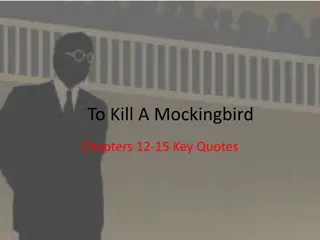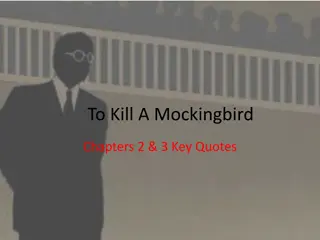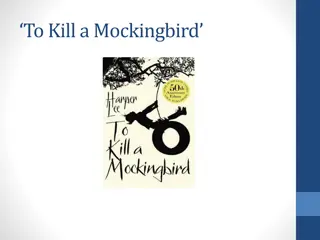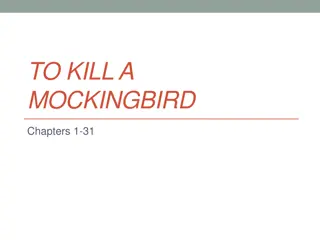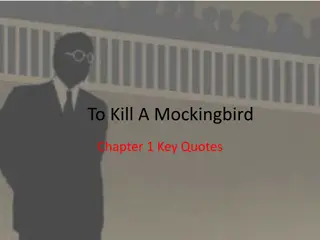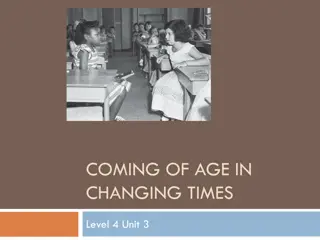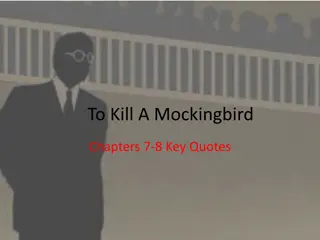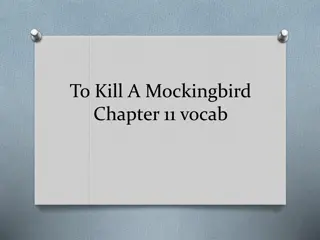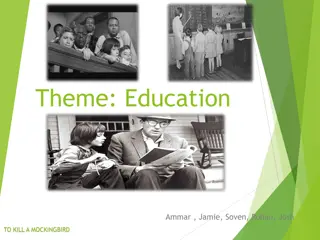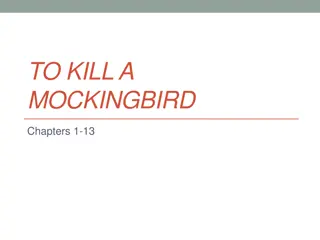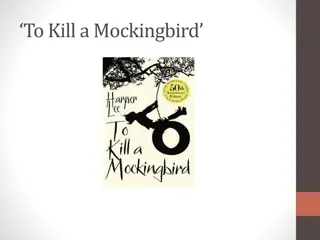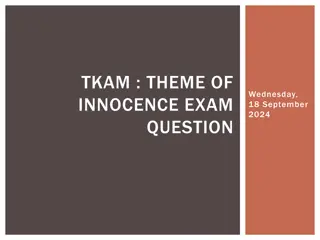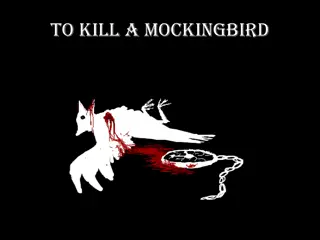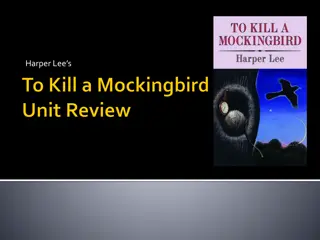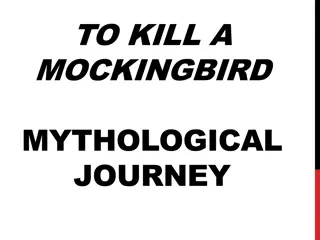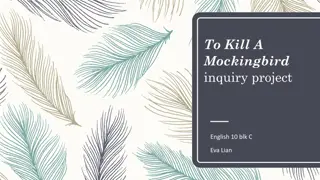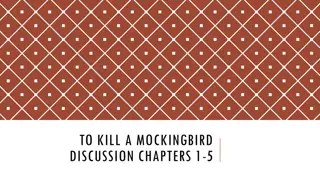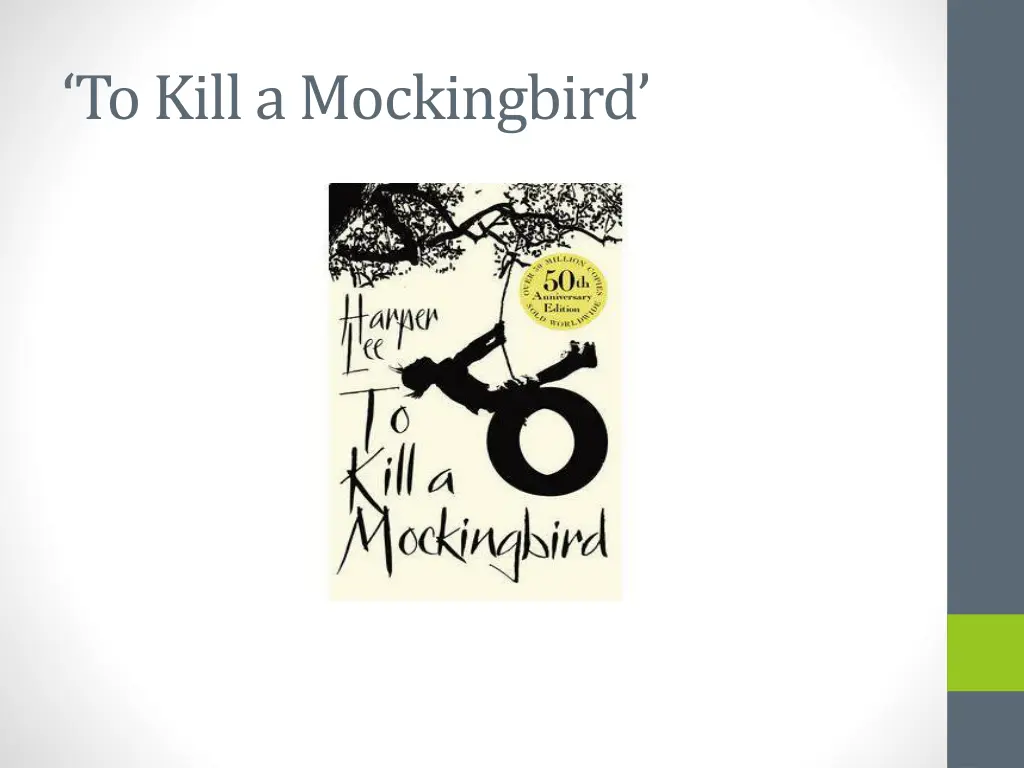
To Kill a Mockingbird Plot Summary and Theme Analysis
Explore the plot summary of "To Kill a Mockingbird" from Chapter One to the end, where Scout, Jem, and Boo Radley's intertwined lives culminate in a dramatic event. Witness the themes of prejudice and growing up, as Scout learns valuable lessons about empathy and understanding. Dive into the complexities of Maycomb's society and the powerful impact of standing up for what is right.
Download Presentation

Please find below an Image/Link to download the presentation.
The content on the website is provided AS IS for your information and personal use only. It may not be sold, licensed, or shared on other websites without obtaining consent from the author. If you encounter any issues during the download, it is possible that the publisher has removed the file from their server.
You are allowed to download the files provided on this website for personal or commercial use, subject to the condition that they are used lawfully. All files are the property of their respective owners.
The content on the website is provided AS IS for your information and personal use only. It may not be sold, licensed, or shared on other websites without obtaining consent from the author.
E N D
Presentation Transcript
Chapter Twenty-Six to the End Plot Summary Scout still thinks about Boo, although she is no longer terrified. Jem is changing, becoming a young man, and Scout sees much less of him. When Miss Gates is a hypocrite to Scout s class over Tom Robinson she tells Jem that she is a racist and he yells at her for making him think about the trial. Bob Ewell has been threatening Helen Robinson as she goes to work for Link Deas. Scout learns she will be playing a Pork at the school Halloween pageant.
Chapter One Plot Summary It is a really dark night as Scout and Jem go to the Halloween show. Someone is following them and, at first, they think it is their friend Cecil Jacobs. It is not. They are attacked by Bob Ewell, carrying a knife, as he intends to kill them and get revenge on Atticus. He breaks Jem s arm and Scout is left rolling around on the ground.
Chapter One Plot Summary Scout realises someone else is there and they are fighting with Bob Ewell. It s Boo. He takes the knife off Ewell and, in the struggle, he stabs and kills him. Scout stumbles home and sees Boo carrying an unconscious Jem home. Atticus calls the Sheriff, Heck Tate, once Jem is safely in bed.
Chapter One Plot Summary Atticus decides his son should face trial if he killed Bob Ewell. Heck Tate points out that it was Boo Radley, but, as far as he is concerned, Ewell fell on his knife. He refuses to prosecute Boo or put him in the limelight. Atticus us relieved and he understands that saying Ewell killed himself is an important white lieand he agrees with Tate.
Chapter One Plot Summary Boo reveals himself and Scout walks him back to his house. Scout realises that Boo has been watching them live their lives and all he has wanted is to look after them and be a friend. Scout is starting to grow up as she now realises what it is like to step in someone else s shoes and walk around in them . THE END
Theme Prejudice Quotes: Over here we don t believe in persecuting anybody but then she says It s time somebody taught em a lesson, they were gettin way above themselves. Analysis: Miss Gates tells her class, in reference to the Jews, that no one in America should be badly treated, but after the trial she makes it clear that she doesn t mind black people being treated this way. The phrase taught a lesson shows that she wants black people kept down on the lowest rung of society. Importance to text: This conveys the theme of prejudice because it shows how the hypocritical residents of Maycomb can condemn injustice and segregation abroad but not on their own doorstep.
Key incident Tom Robinson s trial Quotes: Over here we don t believe in persecuting anybody but then she says It s time somebody taught em a lesson, they were gettin way above themselves. (repeat quote) Analysis: Maycomb is a town rife with prejudice, despite appearing very moral and upstanding. Miss Gates tells her class, in reference to the Jews, that no one in America should be badly treated,but after the trial she makes it clear that she doesn t mind black people being taught a lesson . This conveys the hypocrisy of Maycomb s residents. They condemn injustice and segregation abroad but not on their own doorstep. Importance to text: Miss Gates attitude to Tom Robinson s trial is important to the text as a whole because it helps us to see how prejudiced, backward-looking and hypocritical places like Maycomb could be.
Character Atticus Finch Quotes: I don t want him growing up with a whisper about him. Analysis: This quote outlines the fact that Atticus would rather see Jem stand trial without there being a whisper his dad protected him. In other words the law is more important than his emotional tie to Jem and this proves he sees reason and the law as more important even than his emotional relationship with his son. Importance to text: This heightens my understanding of Atticus as a character because it shows how remarkable he is - not many people would be able to separate their emotions from their reason in similar circumstances.
The Ending Quotes: His lips parted into a timid smile, and our neighbour simage blurred with my sudden tears. Hey, Boo, I said. Analysis: When Scout speaks to Boo for the first time, at the end of the novel, we realise this is the first time he has been able to express an emotion to another person in years. The use of the word timid shows that Boo is shy and his recovery from his imprisonment may take a long time. Soon, though, everyone will realise that he is a person and not a monster. Importance to text: This makes the ending effective and satisfactory because Boo Radley finally sees the light of day, it shows how much Scout is becoming a better person - as she grows up - and it helps to restore our faith in humanity after the terrible events of the trial. Effective Ending
The Ending Effective Ending Quotes: Boo s children needed him . Analysis: Boo helps the children because he is still like a child himself and he wants their friendship. Having been kept alone and with no purpose, as a prisoner in his house, this is his means of escape. The word needed suggests that Boo is a caring, gentle character who had been completely misjudged by the people of Maycomb. Importance to text: This makes the ending effective and satisfactory because This makes the ending effective and satisfactory because Boo, having given the children gifts and saved their lives, eventually finds the friendship and freedom he deserves.
The Ending Effective Ending Quotes: See there. Stabbed himself in that soft stuff between the ribs. His whole weight drove it in. Analysis: Bob Ewell, a violent and nasty bully, who has beaten up his own daughter and is really responsible for the sorry fate of Tom Robinson, is killed by Boo to stop him murdering Scout and Jem. Heck Tate makes out he accidentally killed himself so Boo will not be blamed. The phrase stabbed himself shows how little Heck Tate cares about the fate of Ewell. He knows that no one will miss this nasty, evil man. Importance to text: This makes the ending effective and satisfactory because Bob Ewell deserves his fate and his death represents an old, nasty way of life hopefully ending and a new one beginning through Jem and Scout.
The Ending Effective Ending Quotes: Atticus was right. One time he said you never really know a man until you stand in his shoes and walk around in them. Just standing on the Radley porch was enough. Analysis: Scout has learned a lot about empathising with other people and not listening to ignorant gossip. This shows that she is turning out to be a decent, moral person, unlike many of the residents of Maycomb. The phrase standing on the Radley porch was enough shows that she doesn t need to be told what is right and wrong anymore, thanks to her dad s teachings she can figure it out for herself. Importance to text: This makes the ending effective and satisfactory because the story has come full circle. Scout is now where she was at the beginning of the novel, just an older and wiser version of herself. Scout and Jem are

